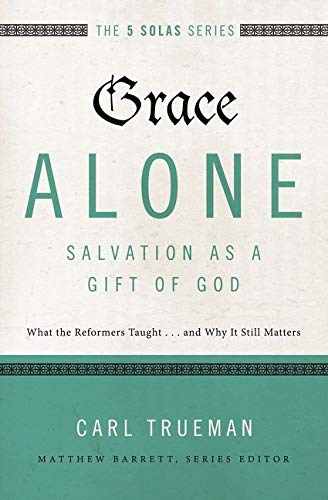Quotes about Self-Righteousness
Behavior modification that’s not empowered by God’s heart-changing grace is self-righteousness, as repugnant to God as the worst sins people gossip about.
The Grace and Truth Paradox, 2003, Used by Permission from Eternal Perspective Ministries, www.epm.org, p. 37.
Righteousness never comes by faith in self, but by faith in God.
The Grace and Truth Paradox, 2003, Used by Permission from Eternal Perspective Ministries, www.epm.org, p. 68.
Get this book!
Man cannot be righteous in God’s sight until he repents of his own expectation that he can be righteous in his own sight. God is not mighty toward man until man is weak toward God.
If my own righteousness is all that I am relying on, then I have no hope of finding favor in God’s sight. This is perhaps the hardest part of the Christian message to get across to people – the fact that we are not automatically headed for heaven. The truth is that our sin – not just the wrong things that we have done, but the very attitudes of our hearts – drives us away from God. That’s why the gospel has always been better received among the prostitutes and drug addicts and losers than among the rich and famous. These people don’t find it hard to believe that they have nothing to offer God.
Living in the Gap Between Promise and Reality, P&R Publishing, 1999, p. 77. Used by Permission.
Spiritual pride is very apt to suspect others, but a humble saint is most jealous of himself. He is as suspicious of nothing in the world as he is of his own heart. The spiritually proud person is apt to find fault with other saints…and to be quick to notice their deficiencies. But the eminently humble Christian has so much to do at home, and sees so much evil in his own heart, and is so concerned about it, that he is not apt to be very busy with other hearts… Pure Christian humility disposes a person to take notice of everything that is good in others, and to make the most of it, and to diminish their failings, but to give his eye chiefly on those things that are bad in himself.
It is easier to cry against one-thousand sins of others than to kill one of your own.
So when we call pain a problem, we claim we do not deserve it. We are even prepared to scuttle God to maintain our own innocence. We will say that God is not able to do what He would like, or He would never permit persons such as ourselves to suffer. That puffs up our egos and soothes our griefs at the same time. “How could God do this to me?” is at once an admission of pain and a soporific for it. It reduces our personal grief by eradicating the deity. Drastic medicine, indeed, that only a human ego, run wild, could possibly imagine.
Self-righteousness is a sense of moral superiority that appoints us as prosecutor of other people’s sinfulness. We relate to others as if we are incapable of the sins they commit. Self-righteousness wages war against mercy.
A taste of righteousness can be easily perverted into an overweening sense of self-righteousness and judgmentalism.
Disciplines of a Godly Man, Crossway Books, 1991, p. 140. Get this book!
We start each day with our personal security resting not on the accepting love of God and the sacrifice of Christ but on our present feelings or recent achievements in the Christian life. Since these arguments will not quiet the human conscience, we are inevitably moved either to discouragement and apathy or to a self-righteousness which falsifies the record to achieve a sense of peace. But the faith that is able to warm itself at the fire of God’s love, instead of having to steal love and self-acceptance from other sources, is actually the root of peace.
The very nature of self-righteousness is to justify self and condemn others. In so doing people play God, because they judge themselves on the basis of their own standards and wisdom. Self-righteousness is the worst of sins because it is unbelief. It trusts in self rather than God. It trusts in self to determine what is right and wrong and to determine who does what is right or wrong. Self-righteousness claims to be both lawgiver and judge, prerogatives that belong only to the Lord.
God sends no one away empty except those who are full of themselves.
There is no pride so dangerous, none so subtle and insidious, as the pride of holiness.
I am afraid there are Calvinists, who, while they account it a proof of their humility that they are willing in words to debase the creature, and to give all the glory of salvation to the Lord, yet know not what manner of spirit they are of. Whatever it be that makes us trust in ourselves that we are comparatively wise or good, so as to treat those with contempt who do not subscribe to our doctrines, or follow our party, is a proof and fruit of a self-righteous spirit. Self-righteousness can feed upon doctrines, as well as upon good works; and a man may have the heart of a Pharisee, while his head is stored with orthodox notions of the unworthiness of the creature and the riches of free grace.
Obedience that doesn’t cost us anything may be more natural and glib than Christian. After all, self-righteousness “obeys” — and wonders impatiently what’s wrong with everyone else.
One of the reasons teenagers are not excited about the gospel is that they do not think they need it. Many parents have successfully raised self-righteous little Pharisees. When they look at themselves, they do not see a sinner in desperate need, so they are not grateful for a Savior (Timothy Lane and Paul David Tripp).
We have so much of the Pharisee in us by nature, that it is sometimes well that our good is hid from us… It is a good life which is attended with a faith of righteousness and a sense of corruption. While I know Christ’s righteousness, I shall the less care to know my own holiness. To be holy is necessary; to know it, sometimes a temptation.
God is none other than the Savior of our wretchedness. So we can only know God well by knowing our iniquities… Those who have known God without knowing their wretchedness have not glorified Him, but have glorified themselves.
Truly it is evil to be full of faults, but it is a still greater evil to be full of them, and to be unwilling to recognize them.
Beware of self-righteousness in every possible shape and form. Some people get as much harm from their “virtues” as others do from their sins.
Many have passed the rocks of gross sins – who have suffered shipwreck upon the sands of self-righteousness.
The righteousness of Christ is to be magnified – when the righteousness of a Christian is not to be mentioned.
We are blessed when we are able to see our sinful depravity. The curse is on self-righteous people who believe they are already acceptable before God. Therefore they will never come to Him for grace. Yet when we see our sins and the unacceptability we have before a holy God it then drives us to Jesus Christ, not for merit, but for His mercy.
The bottom line is that we are all hardwired to reject the complete and freely given righteousness of God in a desire to establish our own righteousness (Rom. 10:3). Like Adam and Eve, we search frantically for fig leaves to cover our spiritual nakedness. We think we need to do stuff or rest on our past spiritual achievements to receive God’s love. Deceived by our pride and our feelings, we rob glory from Jesus Christ and seek to find a false sense of peace in our own adequacy.
The more I trust in my self-righteousness, seen by God as “filthy rags,” the more my sense of “deservedness” or entitlement will actually keep me from knowing Christ. Hell comes from pride leading to merit leading to divine entitlement. Heaven results from unworthiness leading to desperation leading to grace and mercy.
Like Muslims we assume that God will judge us “on balance.” If our good deeds outweigh our bad deeds, we will arrive safely in heaven. But, alas, if our evil deeds outweigh our good ones, we will suffer the wrath of God in hell. We may be “marred” by sin but in no wise devastated by it. We still have the ability to balance our sins with our own righteousness. This is the most monstrous lie of all.
Beware of self-righteousness. The black devil of licentiousness destroys his hundreds, but the white devil of self-righteousness destroys his thousands.
The saints are sinners still. Our best tears need to be wept over, the strongest faith is mixed with unbelief, our most flaming love is cold compared with what Jesus deserves, and our intensest zeal still lacks the full fervor which the bleeding wounds and pierced heart of the crucified might claim at our hands. Our best things need a sin offering, or they would condemn us.
Self-righteousness exclaims, “I will not be saved in God’s way; I will make a new road to heaven; I will not bow before God’s grace; I will not accept the atonement which God has wrought out in the person of Jesus; I will be my own redeemer; I will enter heaven by my own strength, and glorify my own merits.” The Lord is very wroth against self-righteousness. I do not know of anything against which His fury burneth more than against this, because this touches Him in a very tender point, it insults the glory and honor of His Son Jesus Christ.
The greatest enemy to human souls is the self-righteous spirit which makes men look to themselves for salvation.
It is easier to save us from our sins than from our righteousness.
Every time we look at the cross, Christ seems to say to us, “I am here because of you. It is your sin I am bearing, your curse I am suffering, your debt I am paying, your death I am dying.” Nothing in history or in the universe cuts us down to size like the cross. All of us have inflated views of ourselves, especially in self-righteousness, until we have visited a place called Calvary. It is there, at the foot of the cross, that we shrink to our true size.
Taken from The Message of Galatians by John R.W. Stott. Copyright(c) 1968 John R. W. Stott. Used by permission of InterVarsity Press, PO Box 1400, Downers Grove, IL 60515. www.ivpress.com. http://www.ivpress.com/cgi-ivpress/book.pl/code=288, p. 179.
Human self-righteousness denies the need for the saving, enabling grace of Christ. Human righteousness embraces the cruelest of Satan’s lies, that a person can be righteous by keeping the law. If that were true, there would have been no need for the birth, life, death, and resurrection of Christ.
Age of Opportunity, P&R Publishing, 1997, p. 83, Used by Permission. Get this book!
There is nothing that will put you in your place, nothing that will correct your distorted view of yourself, nothing that will yank you out of your functional arrogance, or nothing that will take the winds out of the sails of your self-righteousness like standing, without defense, before the awesome glory of God.
Familiarity by Paul David Tripp taken from Dangerous Calling by Paul David Tripp, copyright 2012, Crossway Books, a division of Good News Publishers, Wheaton Illinois 60187, www.crosswaybooks.org, p. 121.
Why do any of us get upset or tense when confronted? Why do any of us activate our inner lawyer and rise to our own defense? Why do any of us turn the tables and remind the other person that we are not the only sinner in the room? Why do we argue about the facts or dispute the other person’s interpretation. We do all of these things because we are convinced in our hearts that we are more righteous that how than we are being portrayed in the moment of confrontation. Proud people don’t welcome loving warning, rebuke, confrontation, question, criticism, or accountability, because they don’t feel the need for it. And when they do fail, they are very good at erecting plausible reasons for what they said or did, given the stress of the situation or relationship in which it was done.
Self-Glory by Paul David Tripp taken from Dangerous Calling by Paul David Tripp, copyright 2012, Crossway Books, a division of Good News Publishers, Wheaton Illinois 60187, www.crosswaybooks.org, p. 178.
No one gives grace better than the person who is deeply persuaded that he needs it himself. Self-righteous people tend to be critical, dismissive, and impatient with others.
Big Theological Brains and Heart Disease, by Paul David Tripp taken from Dangerous Calling by Paul David Tripp copyright 2012, Crossway Books, a division of Good News Publishers, Wheaton Illinois 60187, www.crosswaybooks.org, p. 55.
No one suffers from self-righteousness who spends much time in prayer.
The only hope there is of standing righteous and acceptable before God is by receiving by faith what another has done for you. All self-attainment, self-accomplishment, self-righteousness must be abandoned realizing the vanity and hopelessness of bringing to pass our own right standing before God. We must humble ourselves before a holy God, recognize our sin, acknowledge our complete inability to remove that sin. Then we must embrace what Christ has done for us, instead of us, paying the penalty of our sin in our place in order to bring to us, by faith, a credited righteousness by which God may rightly justify us as ungodly sinners. Look to Christ and Christ alone.
If we think we are usually good, then God is usually irrelevant… Such thinking ignores the depths of sin in my own heart, and, in essence, it elevates me so that I am just a mildly flawed imitation of God rather than someone completely dependent on Him.
When People are Big and God is Small, P&R Publishing, 1997, p. 100. Used by Permission. Get this book!
“Sinner” is a present-tense description of everyone, including those who have put their faith in Christ. Of course, those who have called Jesus “Lord” are justified, meaning that they are no longer guilty. Also, they have been given the Spirit, which makes them slaves to Christ rather than to sin. But we all are sinners. Perfection awaits eternity.
When People are Big and God is Small, P&R Publishing, 1997, p. 150. Used by Permission. Get this book!
When we look down on others with haughty judgment, we invoke the same compassionless treatment from God toward our infirmities. What a terrifying response from the living God! Belligerent people are told they can expect to be handled by God, not according to His tender compassion, but with severity matching their contempt of others. Such words should sober even the most hardened heart and result in a fresh realization that self-righteousness tops God’s list of man’s most despised iniquities (Prov. 6:16-19).
Recommended Books































